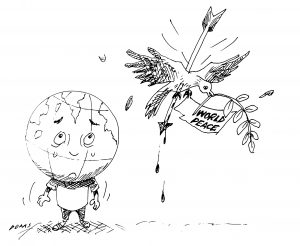World peace attainment has been an aspiration shared by humanity for generations. As we progress into the 21st century, the urgency for fostering an atmosphere of global harmony becomes increasingly crucial. From socio-economic progress and environmental preservation to political stability and cultural exchange, the importance of world peace spans various domains.
World peace plays a pivotal role in promoting socio-economic development across nations. In an interconnected world, peace fosters stability and encourages cooperation, allowing countries to engage in fruitful economic relations. The absence of armed conflicts and political uncertainties nurtures an atmosphere conducive to trade, investment, and technological exchange, which ultimately drives economic growth and poverty alleviation. Moreover, peace enables the equitable distribution of resources and facilitates the establishment of sustainable development practices, essential for tackling shared global challenges such as poverty, hunger, and inequality.
Environmental conservation and sustainability also hinge on the achievement of world peace. Environmental degradation, climate change, and natural resource depletion pose significant threats to the planet and its inhabitants. Collaborative efforts for conservation, renewable energy, and climate resilience can only be effectively pursued in an environment of peace and international cooperation. By transcending geopolitical boundaries, nations can work together towards the preservation of our planet, ensuring its wellbeing for future generations.
Political stability is another vital aspect that underscores the importance of world peace. Internal conflicts and regional tensions can disrupt governance systems, hinder development, and impede progress towards societal well-being. Conversely, when nations experience peace and stability, governments can focus on addressing social issues, enhancing citizens’ welfare, and promoting democratic values. Peace allows for the creation of effective institutions, the rule of law, and the protection of human rights, enabling individuals to thrive and actively contribute to the betterment of their communities.
World peace, then, is indispensable for fostering progress in various arenas of human existence. Its significance extends far beyond military conflicts and the absence of violence. From promoting socio-economic development and environmental sustainability to ensuring stable governance and cultural exchanges, world peace is essential for shaping a prosperous future on a global scale. It is incumbent upon the international community, policymakers, and individuals to recognize the imperative of peace and work collectively to cultivate compassion, understanding, and dialogue as fundamental pillars of a harmonious world.




